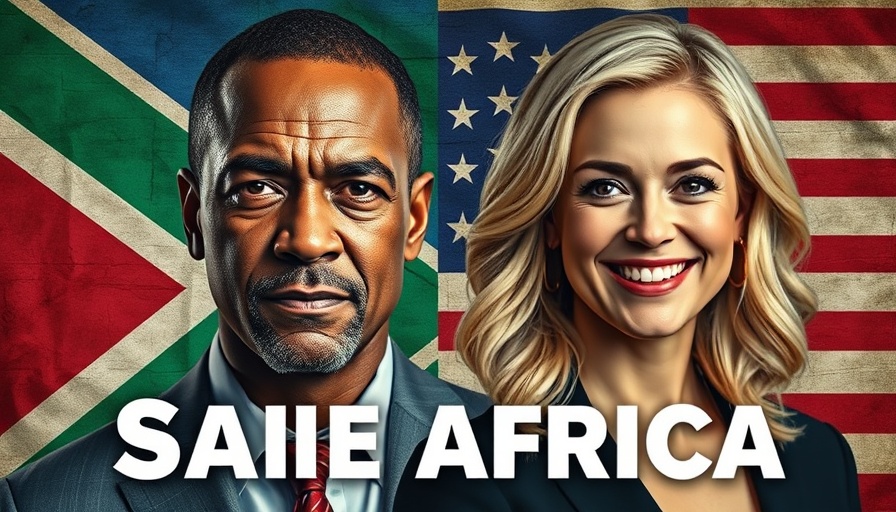
The Implications of Granting Refugee Status to Afrikaners
The recent decision by the Trump administration to grant refugee status to Afrikaners from South Africa has ignited a national conversation about immigration and race in America. This move, which initially appears straightforward, carries with it layers of historical and socio-political context that are essential for understanding what this means for America today.
In 'Why Trump’s Refugee Policy Is Driving the Media Crazy,' the analysis of refugee policies sparks a vital conversation about race, identity, and immigration priorities.
A Historical Perspective: Understanding Afrikaners in South Africa
Afrikaners, primarily descendants of Dutch settlers, have inhabited South Africa since 1652. They underwent significant challenges, especially post-apartheid, as the demographic landscape of South Africa shifted dramatically. Over the years, the Afrikaner community has found itself facing increased discrimination, violence, and economic displacement. The political and social climate in contemporary South Africa has led to fears within this community of systematic oppression, prompting some members to seek refuge elsewhere.
Economic and Social Ramifications in South Africa
Many Afrikaners cite job discrimination and violence, especially targeted killings of farmers, as their primary concerns. Current economic policies, including recent laws allowing the state to seize land without compensation, disproportionately affect white landowners, making it increasingly difficult for Afrikaners to build a secure future. This raises critical questions about what the future holds for them and how these circumstances compare to other global refugee situations.
America’s Refugee Policy Shift Under Trump
Traditionally, U.S. refugee policy has aimed to assist individuals fleeing war, poverty, and genocide, often focusing on groups from predominantly non-white backgrounds. Trump's policy has somewhat reversed this trend, sparking debates not just over who qualifies as a refugee, but also why these specific individuals were granted entrance while countless others, like those from Afghanistan, struggle for similar recognition. Critics argue that any emphasis on race or ethnicity in refugee status undermines the spirit of a diverse, inclusive nation.
Resistance from the Political Left
The backlash from left-leaning media outlets and politicians illustrates a contentious dialogue. The portrayal of this policy often positions it as racially motivated, obscuring the practical reasons for granting refugee status, such as language and cultural assimilation capabilities. The fear of white refugees from South Africa contradicts the long-standing narrative that only non-white immigrants face systemic discrimination. Why the double standard?
Common Misconceptions Surrounding Refugee Status
Notions surrounding assimilation capabilities are frequently misrepresented. The complexities of cultural integration are often simplified to mere racial characteristics rather than looking at shared beliefs in democracy and civil rights. By understanding why Afrikaners might assimilate more quickly, such as their proficient English skills and familiarity with capitalist values, we can better address the broader implications of refugee policies.
Addressing Current Events Through a Broader Lens
What does this mean for present-day America? Beyond the immediacy of the Trump administration’s policies, we find ourselves at a critical juncture where questions of race, immigration, and national identity collide. As the African National Congress (ANC) continues to face criticism for its handling of racial tensions within South Africa, the optics of refugees arriving in America, particularly those from historically privileged backgrounds, open a narrative that challenges traditional perceptions of victimhood.
Conclusion: Understanding America’s Refugee Landscape
The conversation initiated by Trump's refugee policy for Afrikaners serves as a microcosm of broader debates on race, identity, and the American dream. It forces us to confront uncomfortable truths about privilege, systemic oppression, and the responsibilities of immigrant assimilation. For conservatives and the American public alike, understanding these facets is crucial as we continue to navigate an increasingly polarized society.
The dialogue around refugees and race will continue to evolve, and readers are encouraged to stay informed, engage in discussions, and advocate for policies grounded in fairness and factual reality. As we engage with these complex topics, let’s remain committed to fostering a nation built on principles of democracy, freedom, and opportunity for all.
 Add Row
Add Row  Add
Add 




 Add Row
Add Row  Add
Add 

Write A Comment